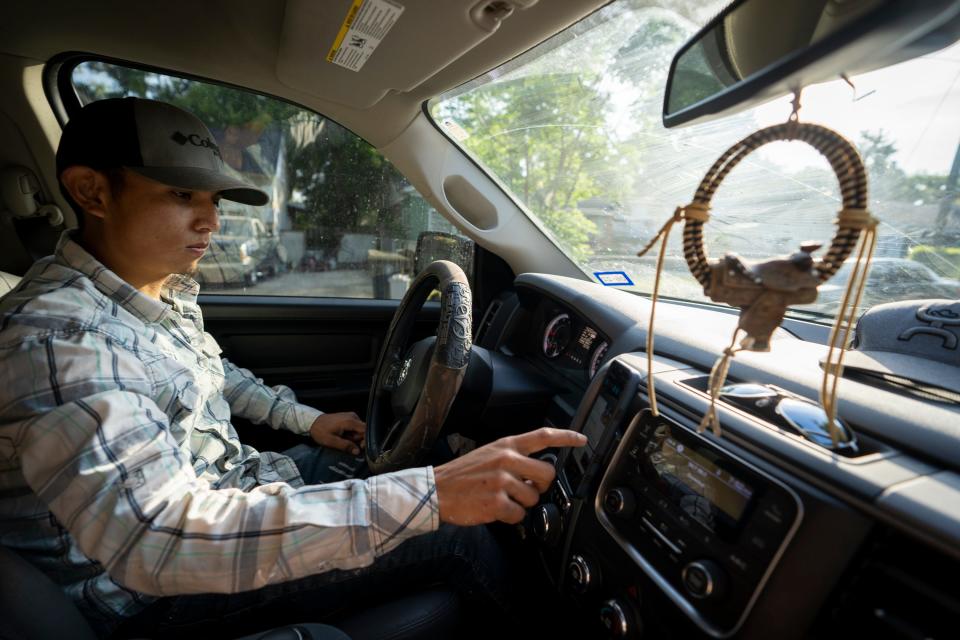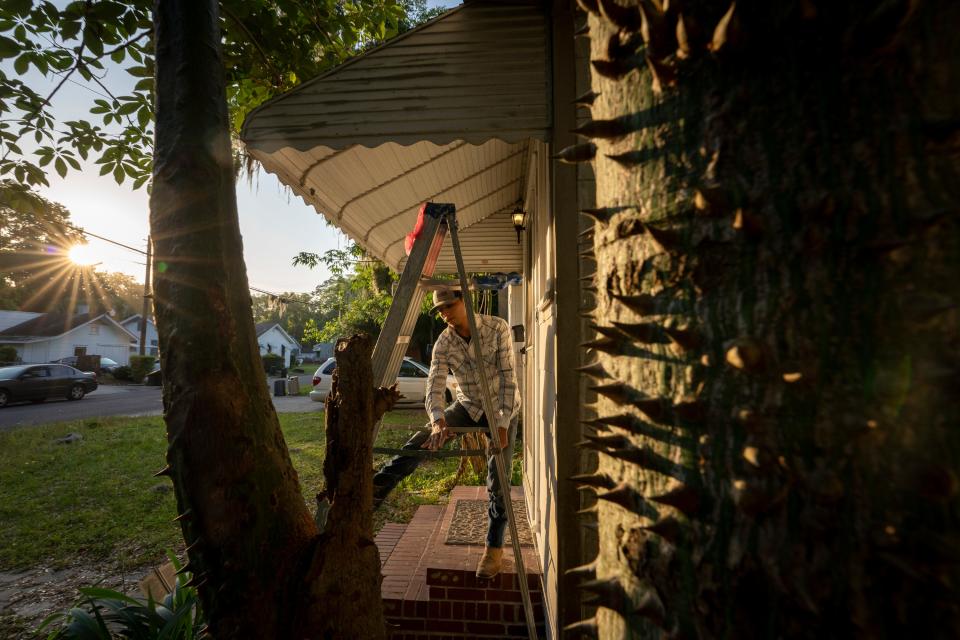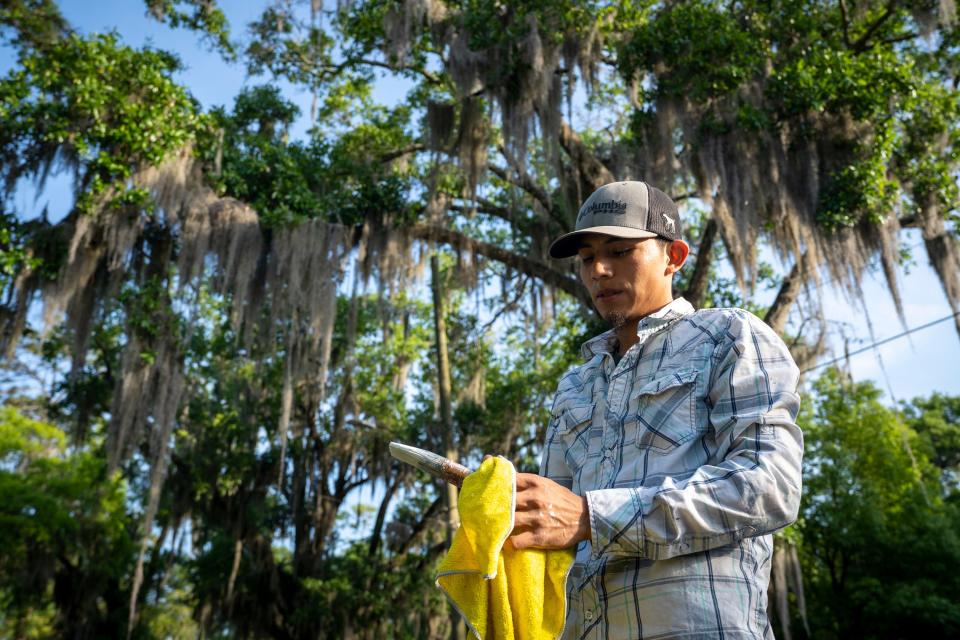Becoming American: This unaccompanied minor nearly drowned coming to the US. Now he has a new life in Florida
The water was cool and dark and swirled around Francis Portillo as he waded into the Rio Grande.
Portillo, then 14 and all alone, felt the water rising to his chest, to his shoulders, to his chin. He began paddling to the other bank and made it more than halfway across, the USA and all its promises just a few feet away.
Suddenly, the current pulled him downriver. His head bobbed in and out of the water as he struggled to stay afloat. He paddled frantically but couldn't break the current. He was going under.
Portillo raised his hand in a final salute to a friend on the far bank when someone clasped his hand and yanked. A team of U.S. Border Patrol agents patrolling the river in an airboat pulled him up and out of the river.
“At that moment, I knew I was safe,” said Portillo, 25.
Portillo fled his native Honduras in 2010 and arrived at the U.S.-Mexican border as a scared unaccompanied minor speaking no English and with no relatives or contacts in the United States. He left behind an abusive father who would routinely beat him with a crocodile-skin belt and crushing poverty that doused any glimmer of hope for his future.
Unaccompanied minors arrive at border by the thousands
A decade later, unaccompanied migrant minors are arriving at the border in record-setting numbers. U.S. Customs and Border Protection encountered 18,990 unaccompanied children in March – double the number of children encountered in February and double the number from March 2019, when border agents intercepted high numbers of migrants. Last year, the numbers sharply dropped because COVID-19 effectively shut down the border.
The majority of the migrant children are housed temporarily in federal shelters, then reunited with a parent or relative living in the USA as their cases proceed through immigration court. Those, like Portillo, without any U.S. contacts – about 10% in previous years – are placed in long-term foster care.
The Unaccompanied Refugee Minor Program, overseen by the U.S. Department of Health and Human Services, has more stringent vetting and oversight than state-level foster care, said Lisa Koop, associate director of legal services at the National Immigrant Justice Center, a legal advocacy group that represents young immigrants.
The program offers counseling and other resources that help children process any trauma they may have acquired in their home country or during their long journey to the USA, she said.
"We’ve seen a lot of these children do an incredible job of assimilating, learning English and going to school and graduating," Koop said of unaccompanied minors. "A lot of them do really well."
Portillo said he feels for the groups of unaccompanied minors arriving at the U.S.-Mexican border. He knows how they feel: scared, anxious, distrustful. He said he hopes they get connected with a good lawyer, as he did, and find their way in the USA.
“They’re fighters,” he said. “We're not all bad people. We just want to be safe.”
Portillo’s story is both a shining success and cautionary tale, advocates said. He excelled in the federal foster care program – but only after an attorney stumbled into him in court, took on his case and guided him out of shelters. His story was corroborated by immigration court filings and interviews with his lawyer.
Belt lashes and beatings
Since he was 8 years old, Portillo was made to wake up at 3 a.m. each morning and milk the cows on the ranch his father oversaw in Ocotepeque, Honduras, near the border with Guatemala. He thrived in school, enjoying the way grammar and reading came easily to him, but was made to drop out in third grade, as his father, Fausto Portillo, increased his workload on the ranch.
A chance encounter with an American riding a motorcycle through town was the first time he heard English. Even though he didn't understand it, he marveled at how it sounded. His grandmother told him if he learned English, he could travel the world. Soon, he was trying to speak the language to the cows he milked.
Several times a week, Portillo’s father beat him relentlessly, sometimes with his belt, other times with tree branches or the flat side of a machete, according to Portillo’s court petition. The welts on his back hardened into scars. At times, the beatings made his ears bleed, he said.
His dad beat him if he came home late or took too long on a chore, Portillo said. Often, he didn't offer any reason at all.
“Every day after work, he would beat me,” Portillo said. “You can only take so much.”
On the evening of April 7, 2010, as his mother, father and four younger brothers slept in another room, Portillo packed two sets of clean work pants and shirts, tucked away 1,800 Honduran lempiras (about $75) he had saved and walked out into the night. He knew he couldn’t stay in Honduras – his father would find him. He thought of the man on the motorcycle and started walking north toward the USA.
“I knew I’d be safe in the United States,” Portillo said. “Even animals have rights there.”
He walked all night, arriving at the Guatemalan border at dawn. There, he ran into a guy he knew who drove him to Esquipulas, Guatemala. He worked odd jobs – helping load trucks or clear a field – made a little money, then continued north, across Guatemala's northern border and into Mexico.
"I had no idea where I was going to end up," Portillo said. "I just made up my mind to keep walking north."
In Mexico, he climbed atop a freight train known as "La Bestia," or The Beast, used by migrants to travel north. Low-hanging tree branches or lampposts occasionally ripped people off the speeding train, flinging them to the ground, he said. He witnessed three people fall to their deaths. Portillo stayed low, climbing off and on the train in towns where he knew he could shower and get something to eat at migrant shelters.
In Nuevo Laredo on the U.S.-Mexican border, he slept on park benches and under stairs and begged for pesos. His only food was one cup of Ramen noodles a day, he said.

Drug cartels prowled the city and often tried to recruit him, Portillo said. He resisted, but his money was almost gone, and he knew the river was tightly controlled by the cartels. It would cost hundreds of dollars to cross, money he didn't have. He was stuck.
One night, a man a little older than Portillo approached him as he slept in the park. They started talking and the man asked if he wanted to cross to the USA with him that night. He knew the spots of the river the cartels didn't patrol. Portillo agreed and met him down by the river. He nearly drowned before he was rescued.
After a brief stay at a Border Patrol station in Laredo, Portillo was transferred to a federal shelter in San Antonio with other unaccompanied minors. He stayed there more than a year, as pro bono legal advisers worked his case through the system. Meals were hot, and the children were allowed to roam outside in the yard. But the high fences and guards reminded Portillo each day he wasn’t free, he said. Several times, he considered giving up and asking to be deported back to Honduras.
He was transferred to another shelter in San Antonio. He went to court hearings, and legal advocates assured him they were close to finding him a permanent home. Day after day, he returned to the shelter.
‘The Willy Wonka Golden Ticket’
In December 2012, more than a year after he had crossed into the USA, Portillo was in court in San Antonio when he was approached by Linda Brandmiller, an immigration attorney who specializes in unaccompanied minors. After hearing a few minutes of his story, Brandmiller said she could help him out of the shelter and into foster care. She offered to take up his case pro bono.
When she asked him in which state he would like his foster family to be, Portillo replied, “Texas or California” – the only two states he could name. He had only one request: that his foster family not speak Spanish. He wanted to learn English as quickly as possible. Within weeks, Brandmiller had his deportation proceedings halted and his application for foster care filed.

By August of that year, he had been approved to move in with Brenda and Phillip McGee in their ranch-style home surrounded by pine tree stands, about 30 miles north of downtown Houston. On his last day at the shelter, a guard asked to see the spiral notebook Portillo used as a journal. She scribbled inside: "No matter how dark the tunnel might seem, if you go through it, you know there'll be light at the end."
Portillo didn't understand a word of it but vowed to be able to read it someday.
Besides family and school, the foster care program provides life skills training and other resources that many migrant children with parents or relatives in the USA might not get, Brandmiller said.
“It’s the Willy Wonka Golden Ticket for unaccompanied minors,” she said. “You get all the bells and whistles of assistance in every avenue of your life.”
Brandmiller said she was happy to see Portillo placed in foster care, but the fact that it took nearly two years from when he first arrived in the country shows how unaccompanied minors without legal help often fall through the cracks.
“If he hadn’t talked to me that day, he’d probably had been deported,” she said.
At his new home, Portillo was initially hesitant, expecting to be transferred again at any moment. Nightmares stalked his sleep.
As he settled into his new bedroom the first night, Portillo sandwiched himself between the box spring and mattress to ward off intruders. Dreams of falling off La Bestia or drowning while trying to reach the USA became increasingly vivid. In another nightmare, cartel members hunted him down, angry that he crossed the river without paying. He slept between the mattresses for weeks, he said.
One morning, Portillo woke up in angst after a particularly vivid nightmare. Brenda McGee folded him into a hug and told him, "Baby, you’re safe. Nothing's going to happen to you here."
The nightmares slowly ebbed.

Initially, communication with his new family consisted mostly of pointing to things – “hammer,” “broom” – and repeating the words over and over until the English stuck. He did what he knew most: helped out around the yard, mowed the lawn, mended fences.
The McGees also fostered two teens from the Republic of the Congo, who didn't speak any English. To try to communicate, Brenda McGee stuck Post-it notes on things around the house – couch, table, toilet – with the name of each item in three languages: English, Spanish and Swahili. The house soon filled with the trilingual sticky notes.
She marveled at how quickly Portillo soaked up the language and his willingness to learn.
"Very smart young man, quick to learn, worked hard," she said. "There was nothing he was afraid to get into."
At New Caney High School, Portillo enrolled in English as a Second Language class and worked with tutors to learn the language. He joined ROTC and made it onto the school's cross-country and soccer teams. He avoided Spanish-speaking students to learn English more quickly.
“It didn’t take me long until I started talking like a normal American,” Portillo said with a hint of a Texas drawl.
Rodeos and carnivals: A new start in America
The McGees took him to rodeos and carnivals and to relatives’ homes for Thanksgiving. They taught him how to pay bills and love country music. Brenda McGee taught him how to drive in her Kia Sorrento. In 2013, he got his Permanent Resident Card, allowing him to live and work permanently in the USA.
“I felt so alive,” Portillo said. “I wasn’t in a cage anymore. I felt free. I felt like someone cared for me.”

It wasn’t always easy. In 2015, while living with the McGees, Portillo was arrested for driving while under the influence after a night of drinking with friends. He said it was a product of hanging out with the “wrong people” and letting his newfound U.S. status get to his head. He served probation and had the case dismissed, a mistake he said he’s learned from and vows not to repeat.
Portillo is fluent in English, works as an assistant foreman for a remodeling company in Jacksonville, Florida, earns about $4,000 a month – a fortune in the small rural Honduran town he left behind. He drives around in a 2020 Dodge Ram pickup.
He travels from one construction site to the next, translating orders for the Spanish-speaking workers and reporting back to his bosses. On his days off, he cooks skirt steaks on his gas grill or sunbathes at the beach with friends.

He keeps in touch with the McGees – whom he calls “mom” and “dad” – and sends about $100 a month home to his mother and brothers in Honduras. His dream, he said, is to become a U.S. citizen and drive heavy machinery paving roads.
A few years ago, Portillo mailed the spiral notebook full of his journal entries to his home in Honduras. One day, he said, he'll return and reread his memories from his days in the shelter, an era that feels like a lifetime ago.
Before mailing it off, Portillo read what the guard had written in it.
"She was right," he said. "America was the light at the end of my tunnel."
Follow Jervis and Colt on Twitter: @MrRJervis, @jaspercolt.
This article originally appeared on USA TODAY: Unaccompanied minors: US border journey can be deadly for immigrants

 Yahoo Movies
Yahoo Movies 
